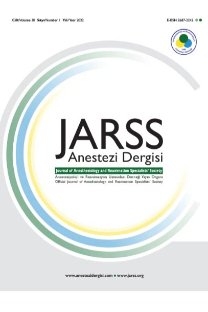Preoperatif biyokimyasal testlerin elektif cerrahi hastalarında etkin kullanımı
Effectively usage of the preoperative biochemical tests in elective surgery patients
___
- 1. Kaplan EB. Shciner LB. Boeckmann AJ. el al. The usefulness of preoperative laboratory screening. JAMA 1985;253(24):3576-81.
- 2. Macario A. Roizen MF. Thisted RA. el al. Reassessment of preoperative laboratory testing has changed the test-ordering patterns of physicians. Surg Gynecol Obstet 1992;175(6):539-47.
- 3. Adams JG Jr. Weigelt JA. Poulos E. Usefulness of preoperative laboratory assessment of patients undergoing elective herniorrhaphy. Arch Surg 1992;t27(7):80l-4.
- 4. Narr BJ, Hansen TR. Warner MA. Preoperative laboratory screening in healthy Mayo patients: cost-effective elimination of lest and unchanged outcomes. Mavo Clin Proc 1991:66(2): 155-9. 5. Macpherson DS. Preoperative laboratory testing: should any tests he "routine" before surgery? Med Clin North Am I993;77(2):289-308.
- 6. Turnbull JM. Buck C. The value of preoperative screening investigations in otherwise healthy individuals. Arch Intern Med 1987; 147(6): 1101-5.
- 7. Johnson II Jr. Knee-Ioli S. Butler TA. et al. Are routine laboratory screening tests necessary to evaluate ambulatory surgical patients? Surgery 1988; l()4(4):639-45.
- 8. Szmuk P. Gurevich B. Dolan Z. et al. The significance and cost of preoperative laboratory screening in young healthy patients in a public hospital in Israel. Hareluah 20_____)2:l4H4):344-6.
- 9. Perez A. Planell J. Bacardaz C, et al. Value of routine preoperative tests: a multicentre study in four general hospitals. Br J Anaeslh 1995;74(3):250-6.
- 10. Hjortrup A. Sorensen C. Dyremose E. el al. Influence of diabetes mellitus on operative risk. Br J Surg 1985;72(10):783-5.
- 11. Powell-Jackson P. Grecnway B. Williams 1_____ Adverse effects of exploratory laparotomy in patients with unsuspected liver disease. Br J Surg 1982:69(81:449-51.
- 12. Chung HM. Kluge R. Schrier RW. Anderson RJ Postoperative hyponatremia. A prospective study. Arch Intern Med 1986; l46(2):333-6.
- 13. Goldman L., Caldera DL. Nussbaum SR. et al. Multifactorial index of cardiac risk in noncardiac surgical procedures. N Engl J Med 1977:297(16):845-50.
- 14. Carson JL. Poses RM. Spence RK. Bonavita G. Severity of anaemia and operative mortality and morbidity. Lancet 1988:1(8588): 727-9.
- 15. Lawrence VA, Kroenke K. The unproven utility of preoperative urinalysis. Clinical use. Arch Intern Med 1988; 148(6): 1370-3.
- 16. Lawrence VA. Gafni A. Gross M. The unproven utility o! the preoperative urinalysis: economic evaluation. J Clin Epidemiol 1989:42(12): 1185-92.
- 17. Macpherson CR, Jacobs P. Dent DM. Abnormal peri-operative haemorrhage in asymptomatic patients is not predicted by laboratory testing. S Afr Med J 1993:83(2): 106-8.
- IX. Rohrcr MJ. Michelotti MC. Nahrwold DL. A prospective evaluation of the efficacy of preoperative coagulation testing. Ann Surg 1988;208( 5 ):554-7.
- IV. Sonnenberg A. Townscnd WF. Preoperative testing for fecal occuli blood: a questionable practice. Am J Gastroenterol 1992:87(10): 1410-7.
- 20. Macpherson DS. Snow R. Lofgren RP. Preoperative screening: value of previous tests. Ann Intern Med 1990; 113( l2):969-73.
- 21. Ajimura FY. Maia AS. Hachiva A. el al. Preoperative laboratory evaluation of patients aged over 40 years undergoing elective non-cardiac surgery. Sao Paulo Med J 2005; l23(2):5(>-3.
- 22. Dzaııkic S. Pastor D. Gonzalez C. Leung JM. The prevalence and predictive value of abnormal preoperative laboratory tests in elderly surgical patients. Ancsth Analg 2001 ;93(2):301-8.
- 23. Hackmann T. Steward DJ, Sheps SB. Anemia in pediatric day-surgery patients: prevalence and detection. Anesthesiology 1991 ;75( 1 ):27-31.
- 24. Close HL. Kıyzer TC. Nowlin Jll. Alving BM. Hemostatic assessment of patients before tonsillectomy: a prospective study. Otolaryngol Head Neck Surg 1994:111(6):733-8.
- 25. Houry S. Georgeac C. Hay JM, et al. A prospective muliicentcr evaluation of preoperative hemostatic screening tests. The French Associations for Surgical Research. Am J Surg 1905; 170( 1): 19-23.
- 26. O'Connor ME. Drasner K. Preoperative laboratory testing of children undergoing elective surgery. Anesth Analg 1990:70(2); 176-80.
- 27. Mallick MS. Is routine pre-operative blood testing in children necessary? Saudi Med J 2006;27( 12); 1831-4.
- ISSN: 1300-0578
- Yayın Aralığı: Yılda 4 Sayı
- Başlangıç: 1993
- Yayıncı: Betül Kartal
The effect of circadian rhythm on vecuronium induced neuromuscular block
A.Günay ÜLKÜ, Aysun POSTACI, Özlem FINDIKSAÇAN, Dilşen ÖRNEK, İsmail AYTAÇ, Nermin GÖĞÜŞ
Preoperatif biyokimyasal testlerin elektif cerrahi hastalarında etkin kullanımı
Serkan TAPAN, HÜSEYİN KAYADİBİ
Wıllıams sendromlu hastada anestezik yaklaşım: Olgu sunumu
Saban YALÇIN, Harun AYDOĞAN, MAHMUT ALP KARAHAN, Halil NACAR
Demet COŞKUN, Didem AKÇALI, Hülya ÇELEBİ
Göğüs cerrahisi ameliyatları sonrası solunum yetmezliği ve yapay solunum desteği
EVREN ŞENTÜRK, Zerrin Sungur ÜLKE
Morbid obesity in cardiac anesthesia: Retrospective evaluation of thirty morbid obese patients
Aslı DEMİR, ÇİĞDEM YILDIRIM GÜÇLÜ, Bahar AYDINLI, Büşra TEZCAN, Ahmet SARAÇ, Aslı DÖNMEZ, Özcan ERDEMLİ
Anestezi pratiğinde sistemik fizik muayenenin önemi: Olgu sunumu
NAMIK NEBİ ÖZCAN, Ahmet BİNDAL, Ayşe ÖZCAN, Hülya BAŞAR
Elektif cerrahi hazırlığında preoperatif ve postoperatif anksiyetenin hasta memnuniyeti ile ilişkisi
Yasemin TURHAN, RAŞİT AVCI, Dilek ÖZCENGİZ
Nadir bir port kateter komplikasyonu: Ayrılma ve fistülizasyon
Cengizhan EMRE, Cihan DÖĞER, İlhami DEMİRKAPU, Dilşen ÖRNEK, Kadriye KAHVECİ, Semih AYDEMİR, Gözde Bumin AYDIN
